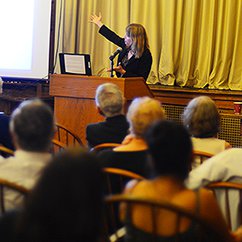Economics studies social relationships pertaining to the production and allocation of resources. Economics has been a regular part of the curricular scene at Wesleyan for nearly 125 years. A minor is also offered.
Students who major in economics often pursue careers in academics, business, consulting, law, finance, and government.
What You'll Study
- As an economics major at Wesleyan, you'll complete introductory courses, covering both micro- and macroeconomic issues; core courses, developing the central tools of theoretical and empirical economic analysis; and elective courses, including FYS (first-year seminar) courses for first-year students as well as higher-level elective courses.
- Majors must complete a minimum of eight graded courses numbered 200 or above, including the three core courses of Quantitative Methods in Economics, Microeconomic Analysis and Macroeconomic Analysis, and five electives.
- In addition to regular electives, you can pursue independent research in an individual or group tutorial offered by a faculty member in the department, as well as take teaching apprenticeship tutorials.
- First-year students contemplating an economics major should acquire the requisite mathematical background as soon as possible.



